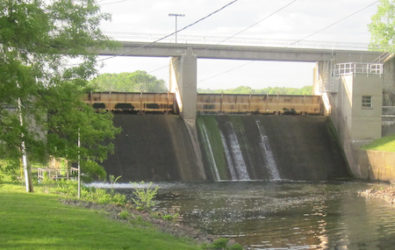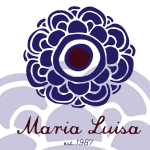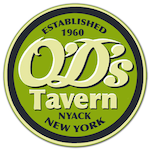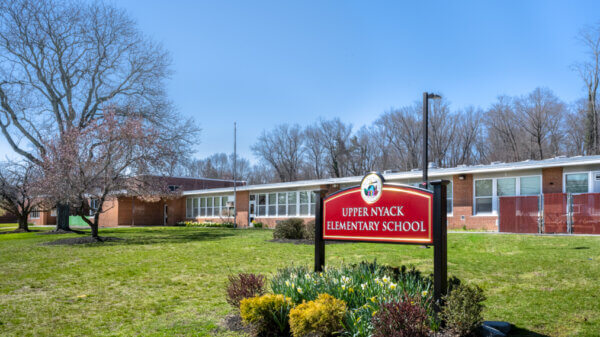County Panel Examines Drinking Water Violation
by Susan Hellauer
 “I’m thirsty!” he yells, and aims his red two-wheeler straight for the old drinking water fountain near the Franklin Avenue playground.
“I’m thirsty!” he yells, and aims his red two-wheeler straight for the old drinking water fountain near the Franklin Avenue playground.
Fine. Down with plastic water bottles. “Drink sink!” But wait, what about that trihalo . . . something?
In late February, customers got an ominous-at-first-glance email from the Nyack Water Department, about an unpronounceable chemical in the water supply, discovered on February 19, in levels above state and federal standards.
The New York State Department of Health [NYDOH] took the full month allowed from the discovery of Nyack Water’s total trihalomethane [TTHM] violation to analyze the issue, craft and send the official message on March 18 — which also went to customers of Suez, the county’s biggest water supplier. It contained not only news of the violation and how it would be re-mediated, but also an explanation of its origin, and steps that water users could take to minimize any risk of adverse effects from this chemical on our drinking water.
But the questions kept flowing in to town and village officials, the County’s Department of Health [RCDOC], Suez, and Nyack Water (serving Nyack and Upper, South, Central, and part of West Nyack).
To flush out the sediment, Rockland County legislator Harriet Cornell, head of the County’s Task Force on Water Resources Management, convened a public panel discussion on Wednesday May 11th. Seven experts from Suez Water, The RCDOH, the NYS Department of Environmental Conservation (DEC), and the Lamont Doherty Earth Observatory in Palisades, addressed the 60 attendees, and answered questions about the total trihalomethane [TTHM] violation and any threats to public health.

May 11 panel on the Suez and Nyack Water TTHM violation. Left to right, Sam Rulli and Dr. Daniel Miller (RCDOH), County Legislator Harriet Cornell, Dr. Steven Chillrud (Lamont Doherty), Ken Kosinski, (NYDEC), Chris Graziano, John Moolick and Keith Cartnick (Suez)
Suez was the only water company at the panel discussion, but the testing procedure that revealed this violation is the same for Nyack Water. Sam Rulli, RCDOH Senior Public Health Engineer, made it clear that Nyack is no less under the microscope than Suez. “RCDOH regulates Nyack Water as a public water system and there are comprehensive [federal and state] monitoring and water quality requirements that need to be met.”
What’s the problem with our drinking water?
So, mandated routine testing caught the problem at Suez and Nyack, but what exactly is it? Panelist Keith Cartnick, Suez’s Senior Director of Water Quality explained that organic matter (leaves, wood, insects, algae . . . ) in water reacts with the disinfectant chlorine (or one of its chemical relatives) to produce compounds called trihalomethanes [THM]. Some of the organic matter is so completely dissolved in the raw water that it passes right through filtration systems. Add the chlorine then and bingo, you have this THM. It’s always there, in every chlorine-disinfected system, to some degree, but when it exceeds the mandated standard of 80 parts per billion, it’s time to address the problem, and bring that ratio down.
Use of chlorine in water treatment in the U.S. began over 100 years ago in Jersey City and it has had an immeasurable impact on public health. You may not like it but, really, you do want chlorine, or another disinfectant, if you don’t want cholera, dysentery, campylobacter or norovirus.
The amount of chlorine added to drinking water varies in reaction to daily tests for bacterial levels in the water. The level of dissolved organic solids varies too, based on time of year, water temperature and speed of water through the system. Water temps are warmer lately, all year round, which enhances the reaction. And water conservation (a good thing) makes for “aging” water in the system that is more likely to react and create THM. If all the right (or wrong) things happen at once, the TTHM level goes up.
Risks and Safety
The TTHM violation level is meant as a warning, and is nothing like a “do not drink” or “boil water” order, which happens when a water main breaks, or there’s some other sort of bacterial incursion. It’s a “start working on this now, please” violation that must be addressed right away, but is not an emergency, as Legislator Cornell’s panelists emphasized.
Even so, the NYDOH notice to customers lists possible long-term effects in those who consume water with THM for 20 to 30 years, like cancer, low birth weights, miscarriages and birth defects. They state that the U.S. Environmental Protection Agency found that “while there is no causal link between disinfection byproducts (including trihalomethanes) and human health effects, the balance of the information warranted stronger regulations that limit the amount of trihalomethanes in drinking water, while still allowing for adequate disinfection.” It’s a balancing act between deadly short-term risks, and possible long-term ones.
Some optional safety steps were given in the Nyack Water TTHM violation letter:
- use bottled water for drinking and cooking purposes, or
- use water pitchers containing an activated carbon filter, or
- use a tap-mounted activated carbon filter, and
- ventilate bathroom areas (exhaust fans or open windows) when showering or bathing to help reduce exposures from chemicals (THM is just one of them) released into the air.
You can consult the Environmental Working Group’s Water Filter Guide for help in choosing a system that works for you. (Note: This group attributes serious health issues to TTHM, chloroform, and other disinfection byproducts, and believes that acceptable levels should be set much lower than they are now.)
Solutions
 Both water companies began working immediately to address the TTHM violation. Suez has rights to the water in the Lake DeForest Reservoir, but also to a county-wide system of public groundwater wells. At the panel discussion, their Operations Manager John Moolick described a process of carefully rebalancing the raw water sources, increasing the proportion of well water, (naturally lower in organic matter), in order to bring down THM levels.
Both water companies began working immediately to address the TTHM violation. Suez has rights to the water in the Lake DeForest Reservoir, but also to a county-wide system of public groundwater wells. At the panel discussion, their Operations Manager John Moolick described a process of carefully rebalancing the raw water sources, increasing the proportion of well water, (naturally lower in organic matter), in order to bring down THM levels.
This Just In . . .
There’s good news for Nyack and Rockland County water customers.
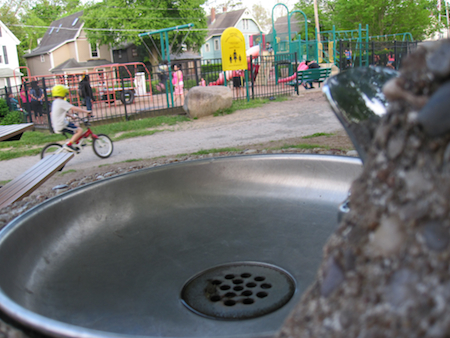 Nyack Water Department Superintendent Harry Williams is happy with the May TTHM test results received on 5/17. “Levels are lower now, under the minimum, for all four [test] sites in our system,” he said.
Nyack Water Department Superintendent Harry Williams is happy with the May TTHM test results received on 5/17. “Levels are lower now, under the minimum, for all four [test] sites in our system,” he said.
“Normally, everything is routine,” he added, “but every now and then we hit a bump in the road. That’s Mother Nature.”
Suez, the commercial provider who supplies most of Rockland County’s water needs, said their most recent tests on 5/24 came back “in complete compliance” with EPA standards for THM.
And that water fountain in the park? It’s up to code again.
For more information, contact the Nyack Water Department.
Although there are local private wells (whose owners are responsible, with RCDOH support, for testing and remediation), there are no public groundwater wells available to Nyack Water, according to Superintendent Williams. The Hackensack River, feeding and flowing from Clarkstown’s Lake DeForest reservoir, is Nyack Water’s sole raw water source. To reduce chlorine (and thus THM), Williams adds another common disinfecting chemical, potassium permanganate [KMnO4] to the raw water entering his plant. (It can’t be added after filtration or it would turn your water purple.)
Solutions pursued by other water companies in the U.S. include microfiltration of raw water , and the costlier but more environmentally friendly ozone, which does not produce halogenated byproduct chemicals. Unlike chlorine, however, it does not, on its own, keep water pipes free of bacteria.
What you can do to help
Those living close to Lake DeForest or the Hackensack River can have the greatest impact — for good or ill — on Nyack’s water quality. Reducing or eliminating pesticides, using only the smallest amount of non-phosphorus lawn and garden fertilizer (phosphorus contributes to algae blooms and thus organic matter in the water), and keeping lawn clippings and excess leaves out of the lake or river will all help. Supervisor Williams and RCDOH’s Rulli both agree that reducing garden fertilizers and pesticides everywhere in the county, and preventing pollution of land and water are good for all of Rockland’s waterways and drinking water.
And even though water conservation played a role in temporarily upping the TTHM level, it’s still the best way to protect our water supply. The Village of Nyack’s “Guide to Water Conservation and Reuse” has tips for homeowners and businesses.
The Rockland County Task Force on Water Resources Management is focused on conservation, among other water use issues, and seeks new committee members.
NEXT WEEK – From Flint, Michigan, to Newark, Suffolk County, Yonkers and now the Clarkstown Schools, lead — a contaminant with devastating neurological effects — is in the news, and very much on the minds of parents, and anyone who turns on the tap or takes a shower. How are the Nyack Water and the Nyack School District addressing this critical issue?
Sustainable Saturdays is sponsored by Green Meadow Waldorf School, Maria Luisa Boutique, O’D’s Tavern and Strawtown Studio.

